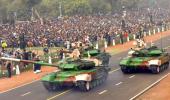 Action has been taken according to a memorandum that requires 'periodic review of performance of government servants'.
Action has been taken according to a memorandum that requires 'periodic review of performance of government servants'.
Ajai Shukla reports.
In an unprecedented move, the defence ministry sacked 13 officers of the Ordnance Factory Board on Thursday, August 31, for non-performance.
This is a revolutionary move in a ministry where decision-making is glacial and bureaucrats recount, only half humorously: 'Officers get sacked for taking controversial decisions; no officer has ever been sacked for not taking a decision at all.'
The dismissed officers are from the Indian Ordnance Factories Service cadre, an organised Group 'A' Central Service.
Action has been taken against them under Fundamental Rule 56(j) and Rule 48(1)(b) of Central Civil Service (Pension) Rules, 1972, which provides for prematurely retiring officers whose overall performance is found unsatisfactory.
The ministry announced on Thursday: 'The government, after having assessed the overall performance of officers of Indian Ordnance Factories Service, following the prescribed procedure, has decided to retire its 13 Group 'A' officers (sic) from government service in public interest due to their overall unsatisfactory performance.'
Action has been taken according to a Department of Personnel and Training memorandum dated March 21, 2014, that requires 'periodic review of performance of government servants with a view to ascertain whether the government servant should be retained in service or retired from service in the public interest'.
This review is to be carried out six months before the officer attains the age of 50/55 years for some categories; and on completion of 30 years of service for others.
Ministry sources say the officers will be entitled to pensions, calculated on the basis of the years they have served.
In December 2015, the government had stated in Parliament that it had dismissed 13 officers and imposed pension cuts on another 45. Since then, several more have been dismissed or compulsorily retired.
However, none were from the defence ministry.
There are 39 ordnance factories spread across the country, in which 100,000 workers manufacture a range of products for the military and police forces -- including rifles, guns, ammunition, vehicles and even boots and uniforms.
The defence ministry has been sharply criticised for maintaining this vast establishing that builds equipment far more inefficiently and expensively than the private sector could.
In 2016-2017, the OFB's 100,000 employees generated revenues of Rs 15,252 crore (Rs 152.52 billion) from its customers, a fraction of the per capita output of private defence companies.
For the current year, the defence ministry has targeted sales of Rs 17,553 crore (Rs 175.53 billion).
Further, the prices of OFB products are fixed based on a 'cost plus' model, in which the customers pay whatever cost the OFB incurs, plus a fixed profit margin.
But now, the defence ministry says: 'The government is taking various steps to improve the performance of Ordnance Factories by making its officers accountable to ensure delivery of quality products to Armed Forces of the nation in prescribed timelines.'
The OFB and its 39 factories are different from the nine 'defence public sector undertakings' (DPSUs), which also supply weapons and equipment to the military.
The OFs are departmental organisations of the defence ministry, which can appoint and remove personnel based on its rules.
In contrast the DPSUs are under the ministry heavy industries and public enterprises, and are placed under the defence ministry only for administrative purposes.
The defence ministry has traditionally protected the OFs, by offering them a guaranteed market for its products.
The Defence Procurement Manual, which governs revenue purchases for the military, mandates that products manufactured by the OFs have to be procured by the military, even if those products are being built more cheaply and better by private industries.
DPSUs and OFs have traditionally argued that their products are more expensive because they are organisationally constrained by rigid government procurement rules and decision-making processes, whereas private firms are more free to take decisions.
However, senior defence ministry bureaucrats, who are coming around to the belief that private firms should be permitted to play a larger role point out that DPSUs and OFs benefit from having obtained land and fixed block free from the government and from not having to service onerous interest burdens.
These advantages more than compensate for the disadvantages, say reformist officers.











